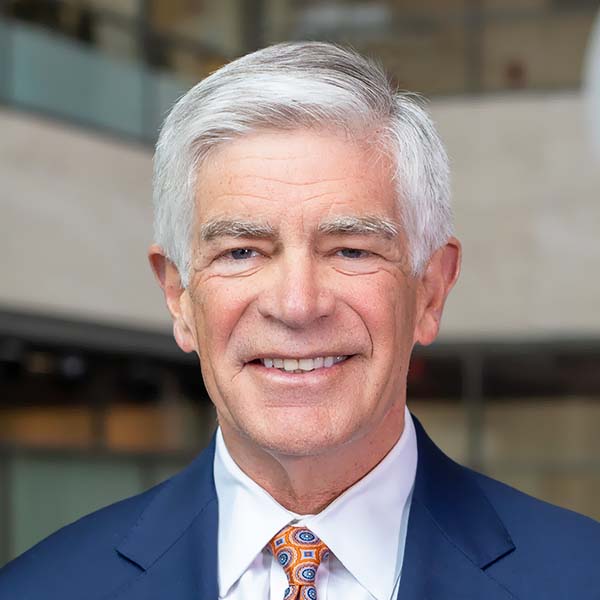Good morning, and thank you. And congratulations! This is a wonderful day. You’ve accomplished so much, and your friends and families are so proud of you … give yourselves a round of applause.
That’s an old trick to make it look like you were giving me standing ovations from the beginning …
Some of you are probably wondering why a Fed president is giving the commencement address to graduates in the field of health. The answer is that I can’t charge a speaker’s fee, so I’m cheap.
I’m just kidding … or at least I think I am. President Klasko?
But in all seriousness, there is some method to the madness. For one, I can tell you that you’ve made an economically sound career choice. And you know it’s true because I’ve just established that they can’t pay me to say it. Also, the data back me up — health care is one of the fastest growing sectors out there, and it’s set to keep expanding for the foreseeable future.
So graduates, you have the security of entering a job market full of opportunities. Which means, parents, you have the security of knowing they won’t be moving back in with you.
There’s also an inextricable link between physical and economic well-being. In the research canon on creating economically strong communities, health is a critical factor. In fact, there’s a ton of research out there on how important health is to every aspect of life. It affects children’s prospects in education and achievement. It affects people’s ability to work and succeed in their careers. It affects entire neighborhoods’ economic potential. And it affects people’s ability to hope.
You’re graduating at a time when medicine is more advanced than ever before. But perhaps the most necessary and healing tool you possess predates Hippocrates. It’s the hope you give to people who are suffering. That’s both the power to heal and the ability to act as a touchstone.
There’s an energy that attaches itself to graduation season. Across the country, you and your peers are headed into a world of endless possibilities.
It’s an air of hope. Because hope, fundamentally, is the ability to see a bright future.
It can be easy to forget, on days like today, that there are pockets dotting the American landscape where hope is in short supply. You’re going to see it more than other people because you’re going to see the effects close up.
You’ll see it in the opioid epidemic. You’ll see it in what recent research calls “deaths of despair.” You’ll see it in communities that have struggled through years of neglect.
The effects are devastating, and they have a ripple effect across the entire health-care spectrum. Some of you will encounter it directly, some indirectly, but it’s likely it will touch you all professionally in some capacity.
What strikes me is that the areas of the country that are struck low by the intersection of poor health and dim economic prospects, the areas that are most affected by these crises, are caught in a spiral of hopelessness. Your connections with people, the part you’ll play in giving them hope, can be life changing. In the words of Desmond Tutu: “Hope is being able to see that there is light despite all of the darkness.”
That’s something to remember when you start your careers because the impact of working in health resonates far beyond treating a single malady. And it’s something to remember when you reach the midpoint, when you’re burned out from being down in the trenches, or when you start to question why you went into this field in the first place. Because believe me, there will be that time. Everyone has it.
So, when it happens, remember that you’re helping to heal people. You’re giving them back their hope, and that’s crucially important. And that goes for everyone here, whether it’s hands-on work with patients, research, or being part of managing the overall system.
Frankly, anyone who helps to tame the bureaucracy of health care deserves a congressional medal of honor …
So today, in the commencement address tradition of dispensing advice, I’m not going to tell you to live every day like it’s your last. I’m not going to tell you to dream the impossible dream. I’m not going to tell you to change the world via disruption, although certainly feel free to do all those things. Instead, I’ll just tell you about the immense power of human interaction and that you can change the world one quiet, empathetic, kind moment at a time.
Keep that with you. You bring hope. You are hope. Never forget that.
And never forget that wherever we wind up, none of us got there alone. Whether it’s friends, families, partners, or even just those who let you borrow their notes when you overslept, someone helped you get here today.
So, I want to take a moment to applaud them, the people in the audience who helped today’s graduates get here, the people who aren’t here but made all the difference, the people who sat beside you in class, and the ones who stood up in front and taught. The ones who gave you hope! They all have a piece of the success and joy of this day.
Let’s give them a round of applause.
I’m a former university president, so I know the rundown of the commencement address pretty well by now, and I think I’ve more or less reached the end.
Requisite joke about students moving back in with their parents? Check.
Advice from the old guy who’s been around a lot longer than the fresh young faces in the audience? Check.
Self-deprecating joke about being old? Check.
That means I’m up to the part where I leave you with a last thought.
I’ve already done the part where I quote someone famous and far wiser than I am, but I’ll do it again and turn to someone who inspired me both personally and professionally: John Gardner, who was a great scholar and, among other things, initiated the White House fellows program that helped start me on my way. He said, “You find that the world loves talent but pays off on character.”
You’re about to enter a world that’s hard work but eminently worth it. The impact you’ll have on hundreds, even thousands, of people throughout your careers will be immense. You will touch people’s lives, you’ll make an incredible difference, and you’ll have the power to heal body, mind, and soul. You will change the world, one person at a time.
Thank you. And congratulations!
Note: The views expressed are my own and not necessarily those of the Federal Reserve System or the FOMC.
View the Full Speech
